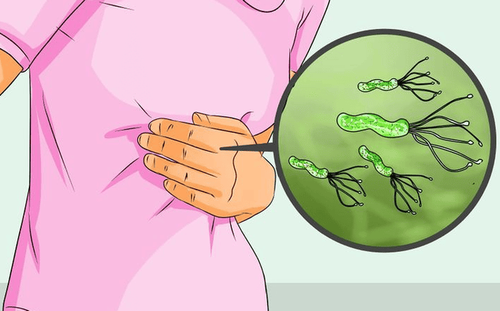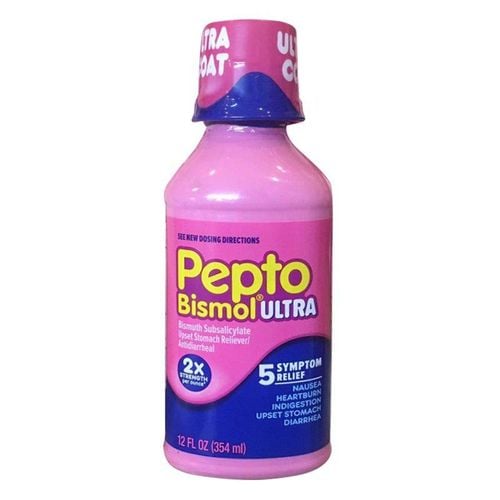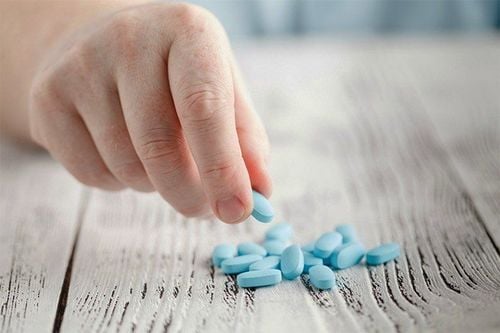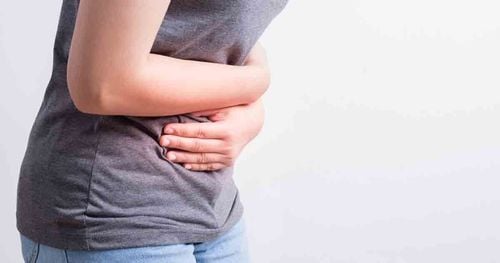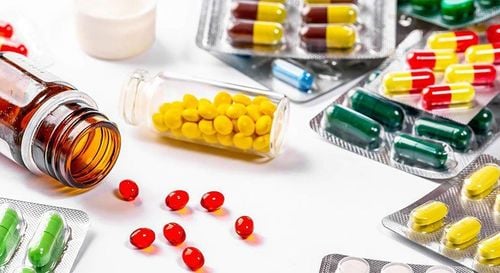This is an automatically translated article.
The article was written by Dr. BS Phan Nguyen Thanh Binh - Head of the Department of Nutrition and Dietetics, Vinmec Central Park International General HospitalPeptic ulcer disease - duodenal ulcer is the most common disease of the gastrointestinal tract, increasing worryingly in Vietnam, with the proportion of the population carrying risk factors up to 70%. The disease can cause severe gastrointestinal disorders and lead to dangerous complications such as gastrointestinal bleeding, gastric perforation or pyloric stenosis. Diet plays an important role in coordinating with treatment to minimize symptoms and improve digestive function and nutritional status of patients.
1. Signs of peptic ulcer disease
Abdominal pain in the epigastrium: The most common sign, the most typical, because the damaged mucosa is more affected by stomach acid. The pain is initially aggravated by extreme hunger or satiety, then can appear very irregularly with greater frequency and severity. Feeling bloated or full of indigestion: Usually occurs at a very early stage, so it is often overlooked. Heartburn or belching Nausea, vomiting Anorexia, weight loss Vomiting bright red or black blood, black stools, signs of anemia, dizziness, lightheadedness: occurs when there is a complication of gastrointestinal bleeding chemical.
Trắc nghiệm: Bận rộn có ảnh hưởng đến sức khỏe của bạn không?
Cuộc sống hiện đại khiến chúng ta vì quá bận rộn mà quên chăm sóc sức khỏe cho chính mình. Ai cũng biết rằng lịch trình làm việc cả ngày có thể khiến bạn kiệt sức, nhưng cụ thể bận rộn ảnh hưởng thế nào tới sức khỏe? Hãy cùng làm thử bài trắc nghiệm dưới đây.
2. Causes of gastritis - duodenal ulcer disease
Due to an imbalance between the offensive (gastric acid levels) and protective factors in the gastric mucosa (the integrity of the gastric mucosa, the mucus that covers the stomach lining), damage to the gastric mucosa is caused. gastric mucosa, including the following causes:
Infection: The most common cause of peptic ulcer. Helicobacter pylori (HP) infection is very common among Vietnamese people (approximately 70%) because it is easily transmitted from person to person through eating and drinking contact, through food and water. Helicobacter pylori can live and multiply in the mucus layer that covers the stomach lining without causing disease, but when the mucus covering the mucosa is broken, it will cause inflammation and lead to stomach ulcers. Use of drugs: Anti-inflammatory pain relievers such as aspirin, ibuprofen, steroids, ... are used improperly or used regularly due to the need for treatment. Some of the risk factors: Smoking can increase stomach ulcers in people with HP bacteria Drinking alcohol increases irritation and wear down the mucus layer that covers the stomach lining and causes irritation to increase production. Acid in the stomach Improper diet: Eating too many hot and spicy spices, fried foods, eating in moderation... Stress: Prolonged stress, or stress after surgery, injury...

3. Diet for patients with gastritis - duodenal ulcer
3.1 Foods to eat
Should enhance foods that have a protective effect on the stomach lining, foods that help heal ulcers or can help reduce acid secretion, and foods rich in vitamins and minerals.
Banana
Banana is ranked at the top of the list of friendly foods for the stomach because of its ability to neutralize excess acid levels in gastric juice and reduce inflammation. Bananas are one of the fruits with a high amount of carbohydrates that help provide energy; high potassium content helps to make up for the deficiency if the patient has diarrhea or vomiting; Pectin soluble fiber is beneficial for people with digestive disorders, constipation and diarrhea.
Rice
The rice is soft, easy to digest, and avoids stimulating the stomach to secrete a lot of acid; has the effect of reducing stomach pain, can absorb the liquid inside the stomach, reducing the risk of diarrhea. The same effect for sticky rice, bread, banh chung, porridge, potatoes... Note that unrefined raw foods such as brown rice, corn, brown glutinous rice or beans... are rich in fiber and vitamins. especially group B), minerals and antioxidants, although very good for health, are difficult to digest when the patient has a stomach disease.
Bread
Bread is also a good choice from the powdered sugar group, low in fat, easy to digest. However, avoid using with butter and jam until the stomach is healthier.
Soup/Soup
Soup/soup with cooked food, soft, does not put "pressure" on the digestive system, and the large amount of water helps dilute the acid concentration in the gastric juice, making it easy for the patient to digest more food .
Apple juice
Apple juice is easy to digest and rich in nutrients, in which the soluble fiber component pectin promotes the activity of the stomach and intestines, preventing diarrhea and constipation.
Coconut water
Coconut water is rich in sodium, potassium, and calcium electrolytes to help supplement deficiencies caused by poor diet or to compensate for loss after diarrhea and vomiting.
Yogurt
Yogurt has many probiotics and enzymes that support the digestive system and improve resistance. There are mixed opinions about the use of yogurt in stomach ailments, the fact is that fat-free yogurt can help in most cases, providing a cushion on the lining and reducing irritation of the stomach. However, you should start small and monitor your body's response to eating to adjust.
Herbal tea
Most herbal teas (without caffeine) help regulate the digestive system, preventing discomfort and bloating. Herbal tea extracted from chrysanthemum also works to help improve inflammation.
Ginger
Ginger can help improve digestive function, relieve symptoms of stomach pain, bloating, indigestion. You can add ginger to your daily menu such as drinking ginger tea or sipping a few slices of raw ginger.
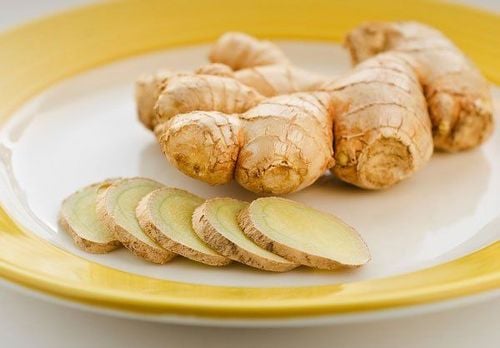
Okra contains many vitamins B, C, E, and other nutrients, especially the mucilage in okra is a complex of polysaccharides, pectin and some other substances. These substances help protect the stomach lining, prevent the risk of damaging the stomach lining, and support the healing of ulcers in the stomach.
Turmeric and honey
The mixture of turmeric and honey is the main oriental medicine in the treatment of stomach ulcers. Turmeric has anti-inflammatory effects, reduces gastric secretion, alkalizes the acidity of gastric juice. Honey has the effect of regulating acid levels in the stomach, avoiding stomach irritation.
Nutrient-rich foods, vitamins A, B, D, K, folic acid, calcium, iron, zinc, magnesium: abundant in cereals, red and dark green vegetables, need to be fortified in the diet to improve improve the deficiency of vitamins and minerals due to poor absorption in gastroduodenal disease.
3.2 Foods to avoid when gastritis - duodenal ulcer
When you have stomach ulcers - duodenum, you should avoid some unhealthy foods as followsFoods that damage the stomach lining such as: Wine, beer, coffee, solid tea; old legumes, old radishes, tree roots...; hot and spicy spices such as pepper, chili, dried ginger...; fried and greasy dishes, grilled dishes with a lot of spices, prepared foods with preservatives, foods such as chopped bones, cartilage, shrimp and crabs, wings, chicken legs, ducks, fish heads ...
Foods that increase stomach acid : Sour fruits (orange, lemon, tangerine, mango, star fruit...); sour foods (vinegar, batch);
Foods that produce gas and bloating such as: Bean sprouts, pickled cucumbers, onions, chives, celery... soft drinks, carbonated juices....
3.3 Eating right when gastric ulcer - duodenal
Food should be chopped, cooked thoroughly, soft, boiled, steamed or braised to help people with stomach pain easier to digest and absorb than stir-fried dishes. Eat slowly and chew carefully, avoid eating while reading books, newspapers, watching movies, ... to help increase secretion of saliva, easier digestion. Eat many small meals a day to help the stomach often have food to neutralize the acid. Do not let the stomach be too hungry to make the stomach empty, stronger contractions cause pain, even bleeding; or eating too full makes the stomach and stomach stretch, weak contractions affect the process of mixing food, increasing rubbing increases pain. Avoid eating too thick, making it difficult for gastric juice to penetrate the middle of the food, or eating too much liquid and too much water to dilute the gastric juice, reducing the ability to digest. Avoid eating foods that are too hot or too cold, both make the stomach contract harder, causing pain. Warm food about 40-50 degrees Celsius is good for digestion - absorption. Conclusion: The article is intended to help readers understand the importance of a reasonable diet in supporting the treatment of peptic ulcer disease, preventing pain and improving the digestive and nutritional status of patients. patient. Please try to follow to have good health for you and your loved ones.
Please dial HOTLINE for more information or register for an appointment HERE. Download MyVinmec app to make appointments faster and to manage your bookings easily.






